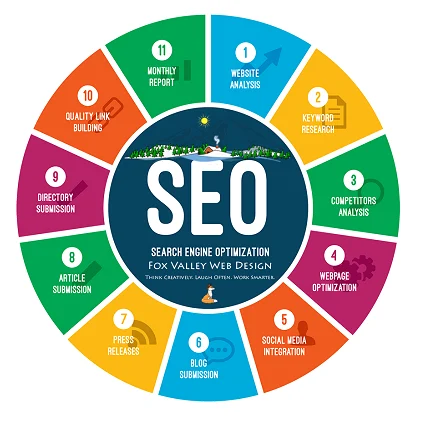Search Engine Optimization (SEO): The Key to Online Visibility and Business Growth
In today’s fast-paced digital world, showing up online isn’t enough—you need to stand out. That’s where Search Engine Optimization (SEO) comes in. Whether you’re running a small local business or managing a global e-commerce site, SEO is crucial for increasing visibility, attracting the right audience, and growing your brand organically.
In this blog post, we’ll break down what SEO is, why it matters, and how your business can benefit from a well-planned SEO strategy.

What is SEO?
SEO, or Search Engine Optimization, is the process of improving your website and its content to rank higher on search engines like Google, Bing, or Yahoo. The goal? To appear on the first page of search results when users search for products, services, or information relevant to your business.
Think of SEO as a roadmap that guides search engines to your website. It helps them understand what your pages are about and determines how useful your content is for users. The better your SEO, the more likely your website will rank higher—and get clicked Matters
1. Increased Visibility
The majority of online experiences begin with a search engine. In fact, over 90% of online activity starts with a search. If your website doesn’t appear on the first page of results, you’re missing out on a massive number of potential visitors.
2. Organic Traffic (Free Visitors!)
Unlike paid ads, SEO focuses on organic traffic—visitors who find your site naturally through search engines. While SEO takes time to build, the traffic you get is sustainable and cost-effective over the long term.
3. Higher Credibility and Trust
Users trust search engines. If your business appears at the top of search results, people are more likely to perceive it as credible and reliable. Strong SEO can build long-term trust with your audience.
4. Better User Experience
Good SEO isn’t just about search engines—it’s about people. A well-optimized website is fast, mobile-friendly, and easy to navigate. These qualities not only improve SEO rankings but also enhance the user experience, increasing your chances of converting visitors into customers.
How Search Engines Work
Before diving into SEO strategies, it helps to understand how search engines work. Here’s a quick overview:
Crawling: Search engines use bots (also called spiders or crawlers) to scan the web and discover new or updated pages.
Indexing: Once a page is discovered, it’s added to the search engine’s index, which is essentially a massive digital library of all the web pages it knows about.
Ranking: When someone enters a query, the search engine sorts through its index to display the most relevant results. Rankings are based on hundreds of factors—these are what SEO aims to optimize.
Key Elements of SEO
There are three main pillars of SEO that work together to improve your rankings:
1. On-Page SEO
This focuses on optimizing individual pages of your website. Key components include:
Keywords: Research and use relevant keywords that your target audience is searching for.
Title Tags & Meta Descriptions: These appear in search results and influence whether users click.
Header Tags (H1, H2, H3): Help organize content and signal important topics to search engines.
URL Structure: Clean, keyword-friendly URLs improve both user experience and SEO.
Image Optimization: Use alt text and compressed images to enhance page speed and accessibility.
2. Off-Page SEO
This involves external factors that affect your site’s ranking. The most important is:
Backlinks: Links from other reputable websites act as endorsements. The more quality backlinks you have, the more authority your site gains in the eyes of search engines.
Other off-page tactics include:
Guest blogging
Social media sharing
Influencer outreach
Brand mentions
3. Technical SEO
Technical SEO ensures that your site is easy for search engines to crawl and index. It includes:
Site Speed: Faster-loading websites perform better.
Mobile-Friendliness: A responsive design is essential as mobile searches now outnumber desktop.
Secure Website (HTTPS): Security is a ranking factor and builds trust with users.
XML Sitemap: Helps search engines understand your site structure.
Fixing Broken Links & Redirects: Ensures a smooth user experience and helps maintain ranking power.
Local SEO: A Must for Small Businesses
If your business serves a specific geographic area, Local SEO is critical. Local SEO focuses on optimizing your online presence to appear in location-based searches (e.g., “coffee shop near me”).
Key Local SEO strategies:
Google Business Profile (formerly Google My Business)
Local keywords
Reviews and ratings
Consistent name, address, and phone number (NAP) across all directories